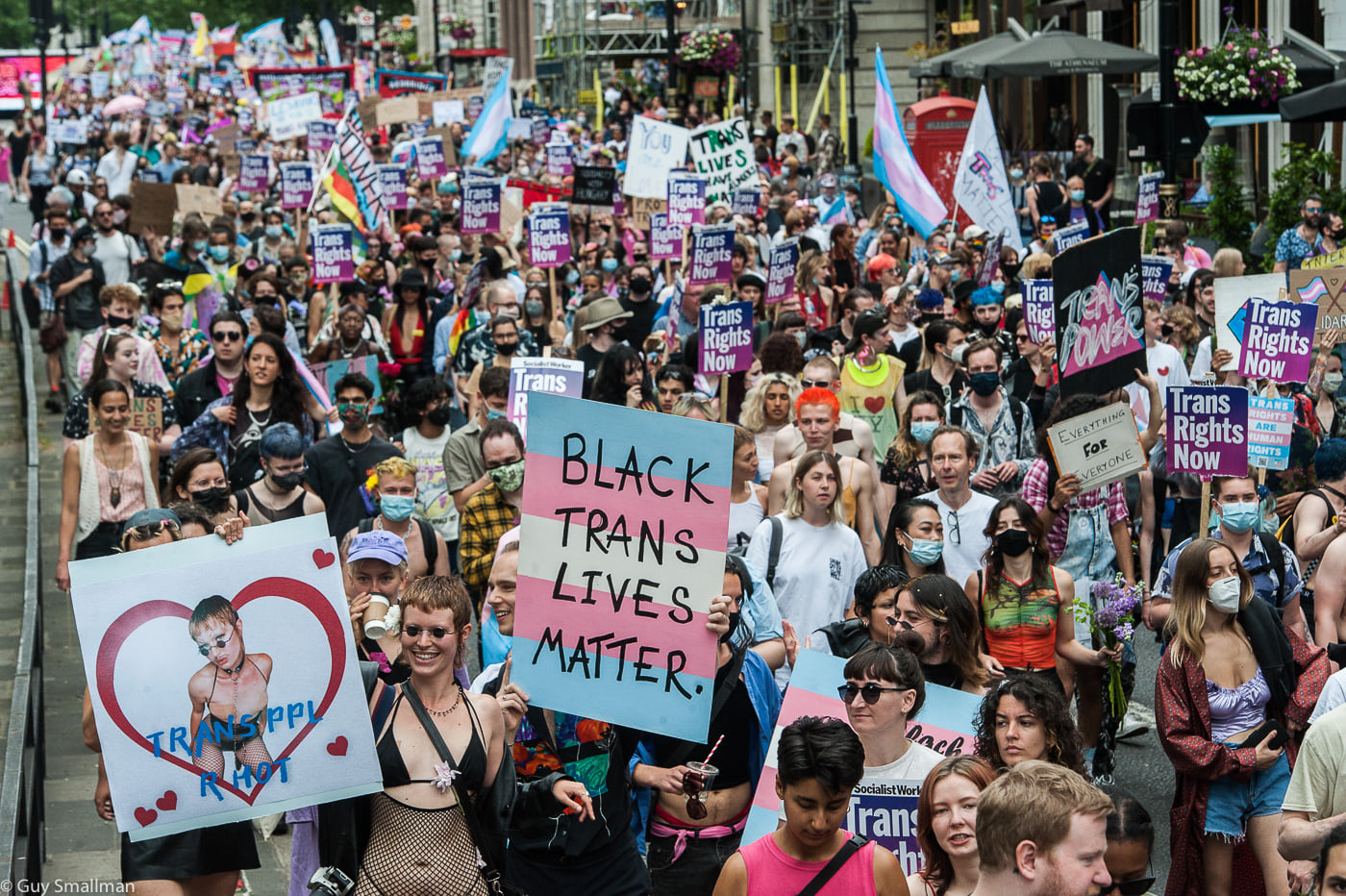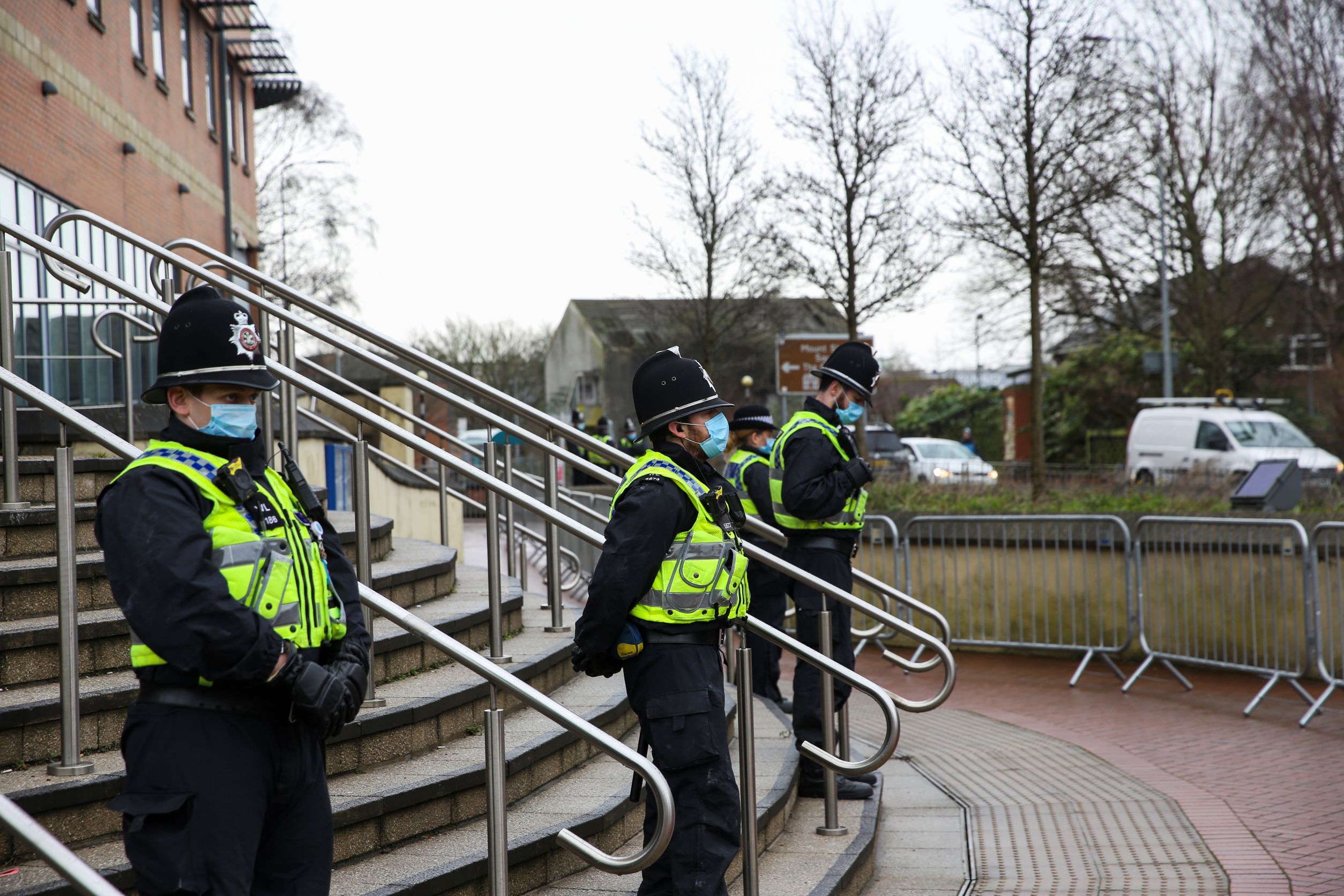
As A Trans Person On Universal Credit, You See How Invasive The State Really Is | Rudy Harries
“The process the DWP uses to disempower and control those who aren’t in work has startling parallels to Gender Identity Clinics’ treatment of trans people.”
Image: protest for Trans rights, London June 2021, copyright Guy Smallman
As a poor disabled trans person, when I discuss my experiences in interacting with the state, those who have not experienced the same struggles are often shocked at the level of control that has been exerted over my life due to parts of my identity.
As someone who experiences several different forms of marginalisation, it is clear to me that the state utilises similar tactics in controlling and limiting the trans population as it does to the disabled population.
Disabled people, and those who cannot work due to physical and/or mental health issues, live in fear of the Department of Work and Pensions (DWP). Although in theory Personal Independence Payments (PIP) can be given to a person who is working, any ‘non-disabled’ activity that the person applying undertakes is taken as proof that the person is faking their disabilities.
What this means is that in fear of losing access to PIP, disabled people often avoid doing activities that they may be able to do. In some cases, this includes the simple act of leaving their house. Indeed, there has been anecdotal evidence of people reporting their disabled neighbours to the DWP after seeing them put out the bins, putting said disabled person’s livelihood at risk.
Similarly, those on Universal Credit (UC) deal with a level of surveillance from the DWP that should shock us. If unemployed, one must account for hours and hours of their time by proving to “work coaches” that they’ve been applying to dozens of jobs, with evidence.
If employed, one must report the details of all the work they’ve done each month; especially overtime, which can cut a payment drastically if over a specific threshold. The DWP is entitled to all of the details of your life, and with constant threats of sanctions (they force you to read the bulletin every single month), they ensure that those on UC live in a state of constant anxiety of becoming destitute for a nebulous reason that they could invent at a moment’s notice.
The process the DWP uses to disempower and control those who aren’t in work has startling parallels to Gender Identity Clinics (GICs), which provide specialist transition-related healthcare to trans people.
GICs use a process known colloquially as ‘gate-keeping’ in order to assess who is and is not ‘really’ trans, regardless of what said trans person may or may not want for themselves. During these assessments, trans people will be asked invasive questions, such as whether they had a ‘good’ childhood, and about the details of their sex lives. If one gives the ‘wrong’ answer, transition-related healthcare can be denied or delayed by several years.
As someone who has experienced both DWP processes and GIC processes, they have a similar effect of making a person feel that they are under a microscope of the state, and that one wrong answer will seriously impact their quality of life.
Furthermore, in many GICs across the UK, nonbinary and/or gender non-conforming trans people, ie those who do not act or appear masculine or feminine enough to fit into heteronormative society, can be denied support outright.
A pervasive idea in the GIC system is that the point of transition is to seamlessly integrate into ‘normal’ society, which of course not every trans and nonbinary person is interested in. The system is designed to suppress trans identity through pressure to conform and ‘fit in’ with patriarchal society.
Those of us who are more gender non-conforming must resort to dishonesty with doctors in order to access treatment we need, dressing up in stereotypical ways, and playing up gendered mannerisms. This is markedly similar to the way that disabled people often feel they must not mention any of their strengths or capabilities, in fear of being denied PIP.
Additionally, trans people must have changed their name and ‘come out’ to everyone in their lives, regardless of whether that is safe for them, before being allowed access to hormones.
This is inherently coercive, and sometimes puts trans and nonbinary peoples’ very lives at risk. I had to flee my own family home after coming out due to experiencing domestic violence related to my trans identity, experiencing homelessness as a result. I had been pressured to come out by the doctors who’d prescribed my hormones.
We also see this coercion and lack of safeguarding in the mechanics for asylum seekers, and particularly when it comes to the treatment of LGBTQ+ asylum seekers. A person seeking asylum must have come out in profoundly unsafe environments in order to qualify for asylum, risking their lives without a guarantee that they will be provided safety. When they reach the UK, they must then spend years ‘proving’ that they are LGBTQ+, with bisexual people in particular struggling to prove that they are ‘gay enough.’
The oppressive gatekeeping processes used in the GIC and DWP can be seen in the Home Office, but intensified massively due to racism and xenophobia.
Asylum seekers’ very presence is constantly under threat, and the ‘wrong’ answer at any time results not just in denial of healthcare or other services, but the basic safety that being here is meant to provide.
All of these mechanisms have the same overall goal: that the state exerts control over those who do not conform to the demands of capitalist society and to force them into line. Its effect is to systematically deny basic support to those who do not or cannot conform, and therefore cannot be controlled.
The extent of the control and intimidation that marginalised and the poorest people face by UK state institutions lays bare just how bad things are.
For this reason, we must build a movement that brings these different groups together. The left cannot accept transphobia within its own ranks by those who seek to divide us and further marginalise the trans population.
Instead we must see the struggles of those most oppressed by the state as deeply intertwined and integral to one another in the fight for our liberation.
Our movement will only succeed if it prioritises the protection of the most vulnerable to state violence and must be built by and for those who live under that oppression.
Rudy Harries is a co-founder of Trans Aid Cymru and an advocate for trans people in Wales.



1 Comment
Comments are closed.